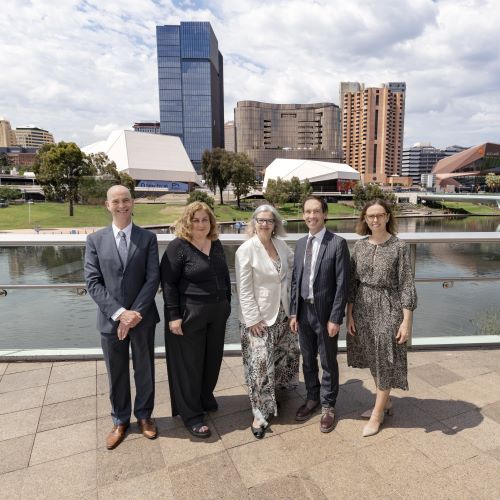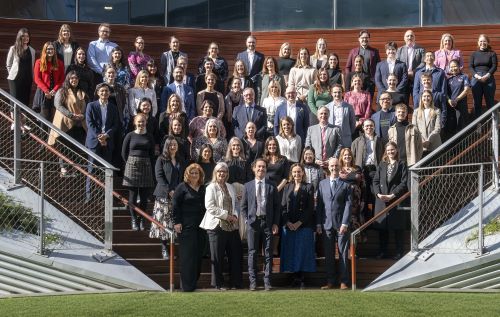
The world's largest centre for research into marketing is celebrating 20 years of transforming the industry and working with some of the biggest brands on the planet - and doing it from the small city of Adelaide, South Australia.
University of South Australia's Ehrenberg-Bass Institute of Marketing Science has become a global leader in research covering evidence-based marketing, advertising, brand equity, new and traditional media, buyer behaviour and shopper research.
Over the years the Institute has worked with brand juggernauts such as McDonalds, Nestle, PepsiCo, and AstraZeneca. Based at UniSA's Business School, it now has a team of more than 70 marketing scientists who work to reshape the world's understanding of marketing, it's principles and practices. While based in Adelaide, the Institute runs advisory boards across North America, Europe and Australasia, bringing together the brightest minds in the business world.
One of its biggest sponsors is global manufacturer of confectionary, pet care and food, Mars Inc, a company that hit a total annual revenue of US$50 billion in 2023 and in 2024 was ranked by Forbes magazine as the fourth largest privately held company in the United States.
Mars products such as Mars, Milky Way and Snickers chocolate bars, M&Ms and Wrigley chewing gum are household names in more than 50 countries, as are its pet care brands Pedigree, Whiskas and Royal Canin.
A two-decade relationship was sparked when Ehrenberg-Bass Director, Professor Byron Sharp delivered a workshop at a Mars Inc. training conference in the early 2000s. The visit evolved into a team of Institute researchers working to transform the role of marketing in the powerhouse company by changing its marketing systems, metrics and practices.
"We were looking for a real academic partnership. A place where the real work begins extending the Laws of Growth into practical application," says Bruce McColl, former Mars Inc's Global Chief Marketing Officer.
Mars revenue grew from US$25 billion to US$35 billion and led to 80-year-old brand Snickers - one of the most iconic products in the confectionary market - to experience sustained double-digit growth and a 30% lift in advertising performance effectiveness.
"As we mark our 20th anniversary, we are looking back on our humble beginnings through to our industry leadership. Our journey has been fuelled by passion, perseverance and unwavering support from our incredible team and sponsors," says Professor Sharp.
"The companies we work with are celebrating lower marketing costs, greater marketing effectiveness and, most importantly, revenue growth."
Prof Sharp has built a solid reputation for challenging traditional marketing notions and the marketing industry's 'everyday nonsense'. His book How Brands Grow: What Marketers Don't Know debunks common myths about brand growth and has become a cornerstone for modern marketing strategies. Heralded as a 'bible' for marketers worldwide, it's sold over 150,000 copies and is available in more than 12 languages.
Global companies like Coca-Cola and Procter & Gamble, owner of iconic household brands such as Pantene, Gillette, Oral B and Olay, have adopted Ehrenberg-Bass principles to optimise their marketing strategies.

One of Prof Sharp's most popularised approaches is the Double Jeopardy Law, a concept that at first glance may seem intuitive or obvious, but its significance lies in the profound implications it has for marketing strategy.
The law states that smaller or less popular brands have fewer buyers, and these buyers are less loyal. Larger brands have both more buyers and enjoy higher loyalty from their customers. Traditional marketing practices often emphasise customer loyalty as being the primary goal for growth - but the Double Jeopardy Law shows that loyalty is a result of scale, rather than a driver of growth.
Prof Sharp says the team's work reveals insights that often challenge long-held beliefs in marketing.
"Our work shows that some of the world's most innovative marketing solutions can emerge from unexpected places," he says. "Adelaide is home to a team that's driving global change in one of the world's most dynamic industries.
Further quotes from Ehrenberg-Bass sponsors and clients
"The Ehrenberg-Bass Institute of Marketing Science opened my eyes to debunking many of the commonly held myths about how brands grow." - Bernice Samuels, former Chief Marketing Officer, First National Bank, South Africa.
"Common sense backed by hard data - the Ehrenberg-Bass Institute keeps our marketers grounded and makes them better long-term stewards of our most valuable corporate assets - our brands." - Jane Ghosh, former UK Commercial Marketing Director - Cereal, Kellogg Company, UK.






